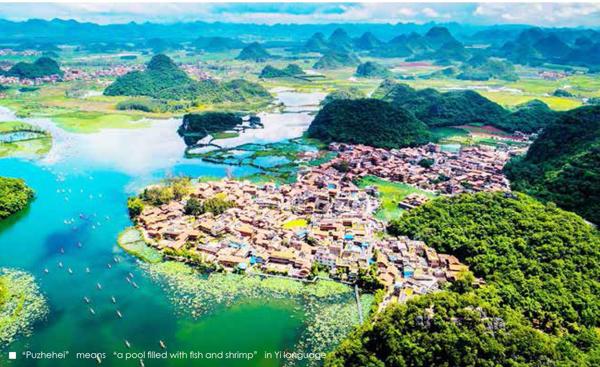Puzhehei: A Beguiling World Far Off the Beaten Track
2020-08-19ByMoTingting
By Mo Tingting



Are you tired of bustling city life? Why not plan a trip to make the most of Augusts dazzling days? Whats your ideal summer escape? Does it involve a blue sky with white clouds, endless green fields, boats on a lake and a vast sea of lotus flowers? All of these can be found in Puzhehei, a natural corridor in Yunnan, China. Since Puzhehei was a filming location for the sought-after TV show Where Are We Going, Dad, it has been regarded as a new hot destination. Now, lets discover its beauty that unintentionally touches the deep corner of peoples hearts.
A pool filled with fish and shrimp
The metropolis can sometimes get too fast-paced, hectic and stressful. So naturally, Puzhehei is a perfect destination to escape. With idyllic beauty, it is situated in the remote Wenshan Zhuang and Miao Autonomous Prefecture, Yunnan, China. The word “Puzhehei” means “a pool filled with fish and shrimp” in Yi language.
Puzhehei is a paradise of photographers, with its limpid lakes, caves, endless acres of lotus blossoms, small villages side by side and migrant birds. Lakes, mountains, karst caves and the generally unspoiled environment make Puzhehei a popular vacation spot for tourists. Named as “the Guilin in Yunnan”, Puzhehei composes a beautiful scenery for your eyes. Guilins scenery is more dramatic while Puzheheis slopes are more gradual. Puzhehei is probably harder to navigate for foreign tourists. Now you have already known Puzhehei is a hidden gem, but, do you know how to explore it to the fullest?
Located in the middle of the Puzhehei Lake, Qinglong Mountain is the best site for viewing the whole area below. You can also enjoy the mysterious caves in great numbers. Not only are these caves full of all sorts of stalactites, but there are also many legends and myths about them, making everyone curious about the heaven-like places.
The unsurprisingly titled Puzhehei Lake (Pearl Lake), is a freshwater lake with clean water. The most fitting way to get the views from the water is by traditional canoes. Boarding a Yi peoples wooden canoe, you will pass along the spellbinding peaks, rivers, sleepy fishing villages and lotus pools. Free from the annoying crowds and noisy motorboats, you can relax in the scenery and immerse yourself into reveries. A fantastic water fighting game when you are taking a canoe makes you obtain a lot of fun. Tourists can hear Zhuang girls singing their love songs while sailing on the crystal water.
Coming to Puzhehei between June and September, boating in thousands of lotus flowers, and smelling the fresh aroma in the air, you will encounter “a dreamland in the sky and a fairyland in the mundane world”. You wont miss the flower tour if you are a photography amateur. Puzhehei provides you with opportunities around every corner to take picture-perfect photos so that they could be used as your next desktop wallpapers.
Another major part of the lake is the food. Local vendors set up grills on narrow rowboats and provide a floating picnic with skewered meats, fish and freshly cut fruit. They are not only
fresh, but also free from pollution. Local people also cook a kind of porridge with lotus leaves to relieve ones thirst and fatigue.
Puzhehei is a well-deserved paradise for migratory birds. There are more than 200 types of wetland animals habitats in this area. The reflections on the lake are the elegant white swans and black swans. Looking at this, would you want to be a bird and settle down here? This is Puzhehei, a real paradise, where once you enter you will not want to leave.
{The metropolis can sometimes get too fast-paced, hectic and stressful. So naturally, Puzhehei is a perfect destination to escape.}
A fiery fete in Puzhehei
In addition to its gorgeous landscapes, Puzhehei also offers a distinct cultural experience. Ethnics living here are mainly Yi, Zhuang and Miao, most of whom manage to keep their various traditions alive and pass them down from generation to generation. Ethnic festivals make Puzhehei a unique place with idyllic scenery and traditional culture. They are undoubtedly temptations for you.
Puzhehei Lake has Yi villages along its shoreline. Many houses mount a small clay tiger image on the roofs, which is obviously a custom shared by local people. Gathering fish and shrimps is a part of Yis lifestyle. A few families use cormorants to catch fish. Most villagers take their canoes out onto the lake to cast nets, and lay long, tubular, netted traps to catch shrimps, small fish and a few crayfish. After pulling in their catch, people lay them out on the walkways to dry.
The Torch Festival of Yi nationality is celebrated in summer. At that time, there will be an art performance full of Yi style in Puzhehei. A torch parade and bonfire party will be held to invite visitors to dance with local people.
Besides, every year in midsummer, Yi ethnic minority here celebrates the Painted-Face Festival by smearing each others faces with black ashes collected from the kitchen. With a history of more than 1,000 years, the Painted-Face Festival is a unique traditional festival of Yi. During the festival, there are activities such as grand performances for the opening ceremony, face-painting carnival, water splashing and fish catching competition. The climax of the activity is when people blacken faces mutually with pot soot to express good wishes. On the festival, lard and chimney soot is mixed into paste to be smeared with each other to make fun. According to Yi tradition, it is told that the darker your face gets, the better your relationship is. In ancient times, their ancestors did so to drive away demons. Nowadays, young people do so to express love to others. Its extremely popular or preferred by young people. Young men and women also use the rite to express their feelings toward one another. Its extraordinarily exciting air attracts ten thousand of people every year. In a bonfire party to welcome tourists, Yi people plaster black charcoal ashes on each others faces. Now, Painted-Face Festival, the brightest and bubbliest time of the year, has become the day to wish for happiness and auspiciousness.
